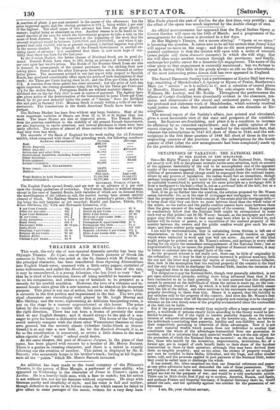METAPHYSICS OF TAXATION: THE NATIONAL DEBT.
TO THE EDITOR OF THE SPECTATOR.
Sut—Mr. Rigby Wason's plan for the payment of the National Debt, though not exactly new, will at the present moment excite some attention, both on account of the apparent desirability of the end to be accomplished and of the apparent equity ot the means suggested. For few persons would doubt that if twenty-four millions of permanent annual charge could be expunged from the national expen- diture by any process of legislation, the nation would feel an immediate, though perhaps temporary relief: and it must be admitted, that a national debt can only be equitably transmitted to posterity on the same principle as a mortgage debt is from a mortgager to his heir,—that is, not as a personal debt of the hew, but as a lien upon the property he derives from his ancestor.
Now, if we go no further into the question, the solution proposed by Mr. Wason seems inevitable: for, as in the case of mortgagor and mortgagee, we cannot say that the property possessed by both consists of the estate plus the mortgage debt,— it being Clear that they can have no more between them than the whole value of the estate, so the nation and the public creditor cannot have more between them than the gross amount of the realized property of the country. Hence it appears to conclusively follow that the National Debt might be extinguished in some such way as that pointed out by Mr. Wason: because, as the mortgager and mort- gagee may divide the estate so that each may have what he is entitled to, and neither will be richer or poorer, so a repartition of the realized property of the country between the owners and the public creditor would give each his own share, and leave neither party aggrieved.
I am told by mathematicians, that in calculating forces friction is left out of consideration, so that it is possible to produce a powerful machine on paper which when embodied in wood and iron will not move. An error of this kind might perhaps be pointed out in Mr. Wason's scheme, and perhaps in every other having for its object the immediate extinguishment of the National Debt; but as impracticability is by no means the present bugbear of financial reformers, it may be better to examine into the alleged facts of the ease. As the proposed scheme is not really new, there can be little of originality in the refutation ; yet it may be that to persons unversed in political economy, _both the one and the other may possess the merits of novelty. Two serious fallacies, then, lurk in the assumption that the realized property of the country is the fund and the only fund liable to discharge the NationalDebt, besides the omission of a very important item in the calculation.
The obligation to pay the National Debt, though very generally admitted, is not put upon satisfactory grounds; nothing more being advanced than that it has been contracted so as to bind posterity. It is then assumed that this obligation cannot be personal on the individuals of whom the nation is made up, on the com- monly admitted theory of debt, by which it is held that personal liability ceases with the life of the debtor, and never survives to his successors except as regards property devolving to them from him. Hence it is argued, that the liability to pay attaches only to the property of the country. And here lies Mr. Wason's first fallacy; for he assumes that all the realized property now existing is to be charged; whereas on his own theory none of the property accumulated since the contraction of the debt can be liable.
But if the proposed scheme would thus unjustly affect a large amount of pro- perty, a multitude of persons clearly liable according to the Cheery would be per- mitted to escape. For if the right to burden posterity depends on the trans- mission of adequate advantages of assets, as the lawyers say, then, as between the individuals constituting that posterity, liability and non-liability _ must lie in their respectively partaking or otherwise of those advantages. Now it is not the mere material wealth which passes from one individual to another that constitutes the whole of the advantages transmitted from one generation to another, and it is notorious that such material wealth was not the sole object for the protection of which the National Debt was incurred: on the one hand, there- fore, those who benefit by the inventions, improvements, institutions, &c. of a former age are in respect of such benefit liable to their share of the hardens transmitted to them by their ancestors, although they may have derived from them no tangible property; and on the other, the owners of property would at any rate be entitled to have Malta, Gibraltar, and the Cape, and other similar items, sold, and the proceeds applied in part payment of the National Debt, before they could be called upon to discharge the whole.
It has indeed, Sir, often surprised me that our financial reformers and peace- at-any-price advocates have not demanded the sale of these possessions. They are trophies of war, cost the nation immense sums annually, are of no acknow- ledged use but for the purposes of war, and would be a very marketable article. There can be little doubt that if put up to auction, America, Russia, and Spaini and perhaps France and Imperial Germany, if Imperial Germany there be, woulc attend the sale, and bid spiritedly against one another for the possession of out fortresses.


























 Previous page
Previous page